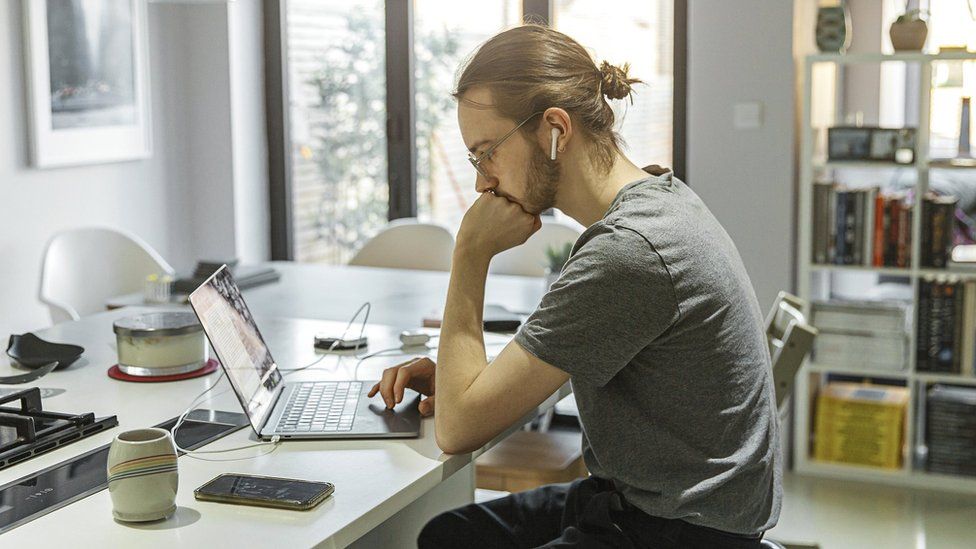Plan B: How will the changes affect the economy?
- Published

Faced with the threat of cases of the new Omicron variant of Covid doubling every two to three days, the prime minister has imposed a new set of restrictions in England.
They include increased requirements for mask-wearing, more working from home and proof of vaccination or Covid status at nightclubs and crowded indoor spaces.
How will these measures - which the government calls Plan B - affect an economy which is still recovering from the impact of previous waves?
How well can the economy cope?
The measures announced on Wednesday for England are much less stringent than those announced last winter.
Similar measures are already in place in Scotland, Wales and Northern Ireland, with tougher ones in many other European countries.
Economies around the world have got used to operating under Covid restrictions. Businesses have adapted and workers learned how to operate from home. Many never went back to the office.
Around a third of working adults in Great Britain work from home part of the time, according to the Office for National Statistics. Just over half travel to work every day, a figure that has risen steadily since restrictions were lifted in the spring.
Data from Remit Consulting showed offices were at just 22% of pre-lockdown occupancy levels last week.
The second lockdown in January 2021 had only one-fifth of the impact on economic output of the first lockdowns, says Jonathan Gillham, chief economist at PwC.
On the impact of Plan B on the economy as a whole, "I would imagine that it will be pretty limited," he says.
Is that true across the board?
For individual companies in particular sectors, the impact could be more severe.
Bars, restaurants, hotels and leisure industries have been badly hit by previous lockdowns and staff shortages - and Plan B could cause further problems.
The Night Time Industries Association, which represents nightclubs, has already warned of a "devastating impact". It claims that Covid passports in Scotland and Wales have already reduced attendance at nightclubs.
Matthew Fell, policy director at the CBI, said: "Fresh restrictions are a big setback for businesses, particularly for those in hospitality and retail who are in a critical trading period, as well as others such as transport."
TUC general secretary Frances O'Grady said the rise of the Omicron variant showed why the UK needed "a permanent short-time working scheme - ready to go when a new crisis hits".
If office workers stay home, it will hurt the businesses which cater to their needs - from the shops that sell lunches to the dry cleaners who press their suits.
PwC estimates the economic impact of home working, from lost custom at those businesses and from the benefits of sharing ideas in work settings, at £15bn a year.
How are people reacting?
The new measures will hit an economy already feeling the effects of the Omicron wave.
There are signs that people are already responding to the news about the new variant and restricting their own behaviour.
Figures compiled by Pantheon Macroeconomics show small falls in the numbers of people booking tables in restaurants, going to the cinema, going shopping or searching for information about pubs, gyms and hairdressers on Google since the news about Omicron emerged.
"It seems that consumers' confidence has been knocked back by news of the new variant," wrote Pantheon's chief economist Samuel Tombs in the research note.
There are already widespread reports of Christmas parties and events being cancelled.
The timing of the emergence of Omicron is particularly unfortunate for shops, restaurants and bars that rely on the festive period for a large proportion of their profits.
The most significant measures to support businesses and workers through earlier waves, such as the furlough scheme and the Self-employment Income Support scheme, have been withdrawn.
Trade unions have called for furlough to be reintroduced, but the government has confirmed that no new economic support package is being planned.
The purpose of new restrictions is to contain the spread of the virus. If they reduce infections, deaths and long-term sickness, they should help to minimise the economic damage it creates.
Governments have to balance the short-term impact with the long-term benefit.
"If it is done at the right time, it is a good thing," says PwC's Mr Gillham. "It is a case of acting early enough and decisively enough for the measures to have the impact they are supposed to. That timing is very difficult to get right."
Could Plan B delay an interest rate rise?
In some areas, the impact of Plan B was felt before it was even announced.
The pound hit its lowest level of the year against the dollar on Wednesday - and newspaper reports of Plan B were "definitely" a factor, says Jane Foley, currency strategist at Rabobank.
The pound often falls when investors think the Bank of England is less likely to put up interest rates.
A member of the Bank's rate-setting Monetary Policy Committee, Michael Saunders, said last week that there might be "advantages" to waiting for more data on how the Omicron wave develops.
And the imposition of new restrictions could be seen as another reason to delay a rate rise, Ms Foley said.
Any delay in the first rate rise will be a relief to households on variable mortgages. But if the pound stays weak, that could contribute to faster increases in the cost of imported goods and energy.
What happens next?
The biggest unknown hanging over the economy is the course of the Omicron variant.
Although it is spreading fast, we still don't know whether it will cause increased levels of severe sickness and death, and how much protection vaccines will bring.
Therefore it's impossible to know how long the latest measures will be necessary for, or whether further restrictions will need to be introduced.
- Published9 December 2021
- Published1 July 2022
- Published30 November 2021